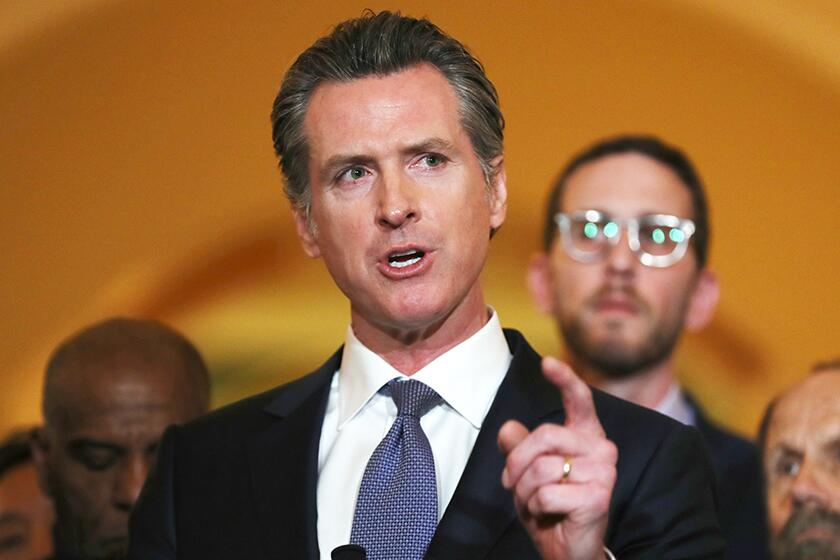UFW seeks new way to organize
- Share via
SACRAMENTO — In the 1970s, United Farm Workers founder Cesar E. Chavez fought in dusty fields and the halls of government to give agricultural laborers the right to cast secret ballots to form unions at California’s farms, ranches and vineyards.
Now, those who came after Chavez want to change the rules, and that has farmers and business groups up in arms.
A bill on the governor’s desk would let the UFW represent workers and bargain for contracts -- without having won the backing of a majority of workers in a government-supervised vote.
The bill, SB 180, by Sen. Carole Migden (D-San Francisco), would bypass the electoral process created by California’s historic Agricultural Labor Relations Act in 1975. Instead, workers could force a farming company to the bargaining table simply by getting a majority of employees to sign cards saying they want a union.
“SB 180 is simply a way for farmworkers to be able to more easily express their preference whether or not they want to be represented by the union,” said UFW President Arturo Rodriguez.
Rodriguez and other proponents say voting by signing cards, both on and off the job site, would protect laborers from being coerced by their bosses into voting against their own interests. They say such coercion can occur even when workers are marking a secret ballot and sealing it in a private voting booth. Farmworkers want the same right to organize by signing cards that public employee unions enjoy, Rodriguez said.
Farmers call those contentions meritless. Union representatives are the ones in a position to coerce workers, especially when they ask people to sign cards in the presence of organizers and pro-union peers, farmers say.
“We feel the secret election is a democratic process. No one is pressured one way or the other,” said Joe Pezzini, vice president of operations at Ocean Mist Farms Inc., which raises artichokes and a variety of other vegetables around Castroville in Monterey County.
The debate over farmworker union elections comes at a tough time for the UFW. Total membership, reported by the union to the U.S. Department of Labor, decreased to 5,500 in 2006 from 26,000 a decade ago.
Longtime UFW watchers say they understand why the union needs to find new techniques to deal with a changed organizing environment. A flood of illegal immigrants has kept farm wages low, and there has been a sharp increase in the use of independent farm-labor contractors, who act as a buffer between the union and employers.
But some of the UFW’s earliest backers say they are puzzled by the union’s reversal of its long-standing support for the secret ballot.
Don Villarejo, the former director of the California Institute for Rural Studies in Davis and a UFW volunteer activist in the mid-1970s, recalled that the union fought hard to include the secret ballot in the state law that guaranteed the rights of farm laborers. He said the UFW alleged that the rival Teamsters union had intimidated people by competing with the UFW and winning a series of sweetheart contracts that helped employers keep the UFW at bay.
“The UFW contended that the secret ballot was the only way people could be protected from intimidation by outsiders,” Villarejo said. “You have to scratch your head and say, ‘What’s going on?’ ”
The UFW, which hasn’t clashed with the Teamsters or other unions in decades, argues that times have changed, and farmworkers, who are mainly illegal immigrants, need new tools to fight for better working conditions.
Support for and opposition to the UFW’s so-called card-check bill falls along predictable lines. Labor unions, liberal church groups and Los Angeles Mayor Antonio Villaraigosa are urging Gov. Arnold Schwarzenegger to sign the legislation into law. To press its point, the UFW stationed about a dozen red-shirted, chanting members on the sidewalk in front of the state Capitol for much of the last week.
More quietly, the state Chamber of Commerce, other business groups and a wide range of employers from California’s $32-billion agricultural industry have been pressing the governor’s office for a veto.
Schwarzenegger, who briefly visited with UFW demonstrators, is sympathetic to the farmworkers’ cause but hasn’t taken a public position on the card-check bill, said spokeswoman Sabrina Lockhart.
The UFW and other unions, principally the United Food and Commercial Workers, have had mixed success winning contracts under the 1975 secret-ballot law. Unions won representation votes in 29 farm labor elections and lost in 19 from 2000 to 2007, according to a state Senate committee analysis of SB 180.
In recent months, UFW units lost two secret votes aimed at removing the union from representing workers at two farming operations. The vote at the larger company, Gallo of Sonoma, is being contested by the UFW, which claims that workers were intimidated into voting the company’s way.
The UFW, however, posted an important victory in May, when it signed a five-year contract with Monterey Mushrooms in Watsonville. And a contract with D’Arrigo Bros. Co., a big Monterey County vegetable grower, is expected to be signed soon as a result of mandatory mediation, UFW President Rodriguez said. The union has been trying to get that deal for more than 30 years.
Miguel Castillo, a veteran farmworker at Giumarra Vineyards Corp. in Kern County, said he was banking on the new law to finally bring the UFW to the large Central Valley grower of table grapes. The union lost a 2005 election there; it claimed misconduct by the company.
Giumarra denied the charges. State regulators ultimately threw out the case without ruling on the validity of the union’s allegations. The union has not sought a revote.
“We were intimidated,” Castillo said. “The supervisors would not let us organize.”
--
More to Read
Get the L.A. Times Politics newsletter
Deeply reported insights into legislation, politics and policy from Sacramento, Washington and beyond. In your inbox twice per week.
You may occasionally receive promotional content from the Los Angeles Times.











